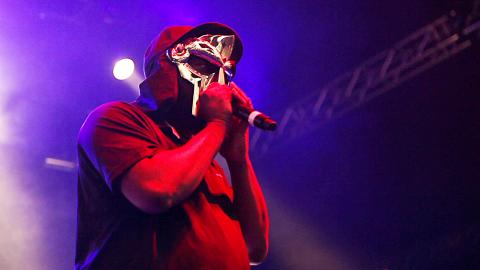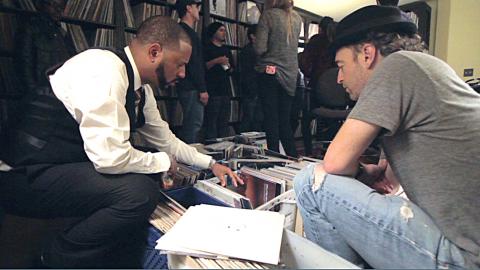David Frazier and Sean Scanlan, two long-term expats and journalists, were a bit miffed when Huashan 1914 Creative Park (華山1914) excluded Urban Nomad, the indie film festival they started, as part of this year’s programming. The co-founders say they have good reason to be annoyed because they’ve held the festival at Huashan for 10 of the past 12 years that it’s been running.
“We have brought thousands of people to Huashan and are maybe the only event that has made the transition from the squatter artist exhibitions of Huashan’s early days to its new cultural industries era,” Frazier said.
He added that though it seems the festival is no longer a priority, “getting angry at bureaucracies is counter-productive.”

Photo courtesy of Urban Nomad
“This is mainly just indicative of Taiwan’s cultural industries push, which is mainly supporting events marketing groups that know how to get government money and gobble up resources. Not many people in the system really care about quality events or programming,” he said.
Whenever there is darkness in a tunnel, though, there is always a ray of hope, and this year, Urban Nomad’s shining beacon was Lux Cinemas in Ximending, one of Taipei’s poshest theaters.
“The weirdness of the whole thing is that two years ago we were showing indie documentaries in a warehouse, and now we are in one of Taipei’s premier commercial cinemas, vying for screen space with Spider Man and Godzilla. Maybe it’s an exercise in guerilla commercialism,” Frazier quipped.

Photo courtesy of Urban Nomad
Stones throw records
One of the movies getting a lot of global attention is Jeff Broadway’s latest feature, Our Vinyl Weighs a Ton (showing Sunday at 9:15pm and May 15 at 6pm), a documentary about the underground hip-hop label, Stones Throw Records.
In Our Vinyl Weighs a Ton, hip-hoppers and celebrities such as Mike D from the Beastie Boys, Questlove, Snoop Dogg, Common and Kanye West pay tribute to Peanut Butter Wolf and the work he has done to make Stones Throw Records one of the most original labels on the music scene.

Photo courtesy of Urban Nomad
“My experience with Kanye was totally normal. He was very polite, turned off his phone, didn’t take any e-mails and didn’t have any assistants hanging around him. He was fully dedicated to the interview,” Broadway said in an e-mail interview.
“When the interview finished he asked me and my guys if we wanted to hear any of his new music, and we went and sat in his dining room as he performed almost all of Yeezus to us,” he said.
Broadway has ties to Taiwan that date back to his university days, when he was living with two Taiwanese who piqued his interest in the “political peculiarity that is Taiwan.” It was an interest that led him to film the documentary about the country called Godspeed Taiwan.

Photo courtesy of Urban Nomad
“I love Taiwan, I really enjoyed my time there, and am disappointed that I couldn’t come back with Our Vinyl Weighs a Ton,” he said.
Opening party
Urban Nomad always starts with a big blowout and this year is no different. Group A from Japan will be headlining and their performance is sure to remind the audience of the mind and genre-bending show that Trippple Nippples gave two years ago, where paint, partial nudity and general eccentricity left people scratching their heads.
This year’s party will be held at Fenghuang Night Club (鳳凰大歌廳) and hosted by Xiao-ying (real name Ying Wei-min, 應蔚民), lead singer of The Clippers (夾子電動大樂隊). He will be joined by Funky Brothers, DJ @llen, Kid Millionaire, DJ Sonia from the Bounce Girlz and (full disclosure) Marcus Aurelius.
Urban Nomad Opening party is Saturday night from 8pm to 4am at Fenghuang Night Club (鳳凰大歌廳) 5F, 159 Xining S Rd, Taipei City (台北市西寧南路159號5樓). Presale tickets are NT$700 and can be purchased at www.indievox.com. Admission at the door is NT$900. All tickets come with one drink.

William Liu (劉家君) moved to Kaohsiung from Nantou to live with his boyfriend Reg Hong (洪嘉佑). “In Nantou, people do not support gay rights at all and never even talk about it. Living here made me optimistic and made me realize how much I can express myself,” Liu tells the Taipei Times. Hong and his friend Cony Hsieh (謝昀希) are both active in several LGBT groups and organizations in Kaohsiung. They were among the people behind the city’s 16th Pride event in November last year, which gathered over 35,000 people. Along with others, they clearly see Kaohsiung as the nexus of LGBT rights.

Jan. 26 to Feb. 1 Nearly 90 years after it was last recorded, the Basay language was taught in a classroom for the first time in September last year. Over the following three months, students learned its sounds along with the customs and folktales of the Ketagalan people, who once spoke it across northern Taiwan. Although each Ketagalan settlement had its own language, Basay functioned as a common trade language. By the late 19th century, it had largely fallen out of daily use as speakers shifted to Hoklo (commonly known as Taiwanese), surviving only in fragments remembered by the elderly. In

Dissident artist Ai Weiwei’s (艾未未) famous return to the People’s Republic of China (PRC) has been overshadowed by the astonishing news of the latest arrests of senior military figures for “corruption,” but it is an interesting piece of news in its own right, though more for what Ai does not understand than for what he does. Ai simply lacks the reflective understanding that the loneliness and isolation he imagines are “European” are simply the joys of life as an expat. That goes both ways: “I love Taiwan!” say many still wet-behind-the-ears expats here, not realizing what they love is being an

In the American west, “it is said, water flows upwards towards money,” wrote Marc Reisner in one of the most compelling books on public policy ever written, Cadillac Desert. As Americans failed to overcome the West’s water scarcity with hard work and private capital, the Federal government came to the rescue. As Reisner describes: “the American West quietly became the first and most durable example of the modern welfare state.” In Taiwan, the money toward which water flows upwards is the high tech industry, particularly the chip powerhouse Taiwan Semiconductor Manufacturing Co (TSMC, 台積電). Typically articles on TSMC’s water demand